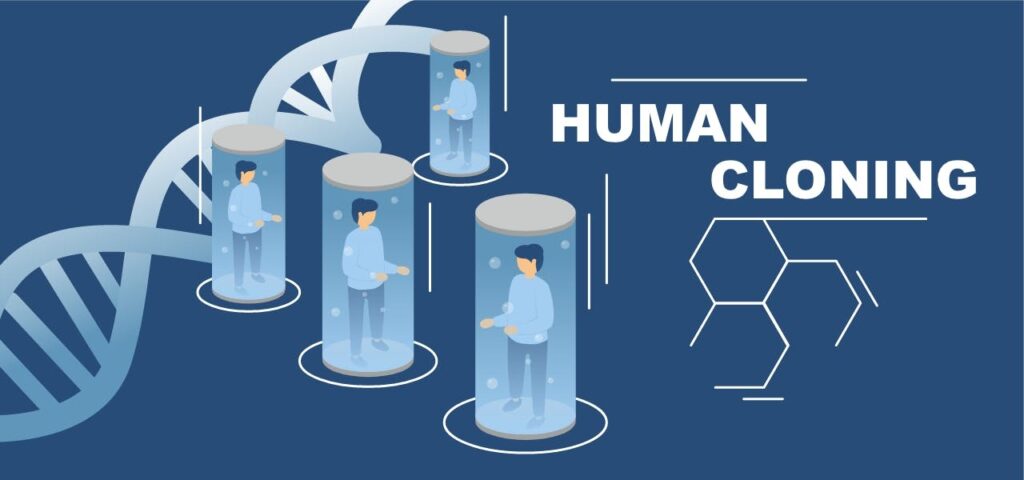Introduction
What is human cloning, and why does it raise so much debate? Human cloning refers to the process of making an identical twin of a human being. The prospect of it is so fascinating, yet it opens up innumerable issues related to biology, ethics, and society. Apparently, such factors not only determine the prospects for human cloning but also point out various concerns that come with it. Grasping these factors will perhaps give us a better estimate of the feasibility and consequences of human cloning.

Human Cloning Biological Considerations
Biologically, how does human cloning work? Normally, this would be done through a process called somatic cell nuclear transfer: the placing of the nucleus of a donor adult cell into an enucleated egg cell—in other words, provoking this reprogrammed egg into dividing and developing into an embryo. A child will arise in a way that is genetically indistinguishable from the donor organism. But what are the rates of success and risks?
- Success Rates: Cloning was a very inefficient process. For instance, Cart, the sheep, the first fully developed cloned creature, was the product of 277 tries.
- Health Risks: A lot of health complications generally arise to afflict cloned animals, premature aging, and weaknesses in their immune systems. Such complications invariably lead to questions about the practicality and morality involved in human cloning.
Ethical Considerations
Why does human cloning provoke ethical debates? The ethical dimensions of human cloning range all the way from the sanctity of human life to concerns over identity and individuality; cloning challenges conceptually our moral and ethical frameworks.
- Sanctity of Life: Cloning, by many, is considered something contrary to the natural process of reproduction and creation—it is “playing God.”.
- Singularity and Personality: There is a likely loss of distinction; clones might be viewed as simple duplicates as opposed to special people by their own doing.
- Assent and Independence: There is another prime moral issue — before the clone is conceived, one can’t agree to be made, so there are inquiries regarding independence and privileges.
How does one think human cloning would change society? That’s deep—the social impact of human cloning could hit everything from family dynamics to society in general.
- Family Dynamics: Cloning could redefine traditional family structures. For instance, a cloned child would, genetically speaking, become the twin of one of his or her parents, an instance of patently difficult family relations.
- Social Inequality: Cloning technology has the potential to increase social inequality in society. Available cloning technology will only be available to rich people hence giving way to a new genetic elite form.
- Legal and Regulatory Challenges: Governments would need to work out extensive regulations dealing with the new legal issues surrounding cloning, such as the rights and status of clones.
Facts and Figures
- Dolly the Sheep: The first normally cloned mammal in 1996 – it took 277 tries.
- Cloning Success Rates: The current success rate for the cloning of animals is 1-3%.
- Health Problems in Clones: Clones generally experience premature aging and other genetic defects. Clones generally experience premature aging and other genetic defects.
Pros and Cons
Pros
- Medical Advances: Cloning might lead to advances in regenerative medicine and organ transplantation.
- Infertility Solutions: Cloning might give new methods of reproduction to infertile couples.
Cons
- Ethical Concerns: Cloning raises the point of significant and serious moral and ethical issues.
- Health Risks: The cloned being is predisposed to some health problems.
- Social Impact: Various social structures will experience inequality as a result of cloning.

Conclusion
What is the future of human cloning? Although the potential applications of human cloning are huge, so are the arising problems involving ethics, biology, and society. Some varieties of cloning may offer a means of revitalizing medicine to cure infertility, but it also carries fundamental risks and moral issues. With new technology, there has to remain a constant social dialogue including exalted ideas that will help in making proper decisions concerning the fate of human cloning.
FAQs
- Q: What is the fundamental or supervisor strategy for cloning used in individuals?
- A: The fundamental strategy for cloning used is called physical cell nuclear trade.
- Q: Has there been any result in cloning an individual?
- A: There has never been an occurrence of powerful cloning nitty gritty in individuals, basically due to moral and normal issues.
- Q: What are the major moral worries about human cloning?
- A: Holiness of life, loss of independence, inquiries of assent, and independence.


Bookmarked, so I can continuously check on new posts! If you need some details about Website Traffic, you might want to take a look at Webemail24 Keep on posting!
Hey there, I love all the points you made on that topic. There is definitely a great deal to know about this subject, and with that said, feel free to visit my blog Seoranko to learn more about Search Engine Optimization.